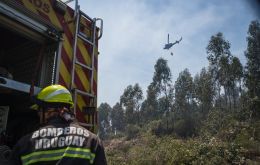MercoPress. South Atlantic News Agency
Environment
-
Friday, January 30th 2026 - 14:16 UTC
Falklands, Tussac restoration project to protect peatlands

Dr. Nicholas Midgley, a senior lecturer and his team from Nottingham Trent University have been in the Falkland Islands for the last three weeks investigating coastal peatland and tussac’s significance for agriculture and wildlife.
-
Tuesday, January 27th 2026 - 11:12 UTC
Offshore oil exploration puts Uruguay at crossroads of investment, courts and conservation

Viridien (CGG Services) has told Uruguay’s Environment Ministry it aims to begin offshore seismic exploration in February, after submitting the environmental management plan required by the National Directorate for Environmental Quality and Assessment (Dinacea) as a precondition to operate in Uruguayan waters, according to local media reporting.
-
Tuesday, January 27th 2026 - 10:38 UTC
Falklands’ expert participates in program on food security and climate change

Falkland Islands Government Department of Agriculture Agricultural Advisor and Chair of the Beef Suppliers Working Group, Olivia Woodiwiss, represented the Falkland Islands at the Green Overseas Program “Strengthening Food Systems Resilient to Climate Change” workshop in Tahiti, last December where she spoke on beef supply chain challenges, stakeholder coordination, and adapting agriculture to climate change alongside counterparts from 15 Overseas Countries and Territories.
-
Tuesday, January 27th 2026 - 08:48 UTC
Falklands joins IWTO Petition: “Wear Wool, not Fossil Fuel”

The Falkland Islands is supportive of the International Wool Textile Organization (IWTO) plea for all in the wool industry to sign the petition “Make the Label Count”, which calls for, “Wear Wool, not Fossil Fuel”.
-
Monday, January 26th 2026 - 13:27 UTC
Winter storm triggers worst U.S. flight-cancellation day since the pandemic, officials say

A sweeping U.S. winter storm of snow and ice delivered the worst single day of flight cancellations since the Covid-19 pandemic, grounding more than 11,000 flights and triggering roughly 17,000 delays on Sunday, according to U.S. Transportation Secretary Sean Duffy. The disruption, hitting during a high-volume weekend travel window, strained airlines, airports and utilities and raised the risk of continued delays into the start of the workweek.
-
Thursday, January 22nd 2026 - 21:58 UTC
Argentina’s Patagonia wildfires: flare-ups in Chubut spur evacuations as crews face “highly complex” blazes

Wildfires in Argentina’s Patagonia continued to pressure communities in Chubut province, with active fronts and repeated flare-ups reported around Epuyén, El Hoyo and Puerto Patriada, as heat, strong winds and very low humidity complicated containment efforts. Local coverage described preventive self-evacuations and round-the-clock watch shifts by firefighters, specialist brigades and residents trying to shield homes, livestock and productive areas.
-
Thursday, January 22nd 2026 - 00:24 UTC
Trump is buying eleven icebreakers from Finland for Arctic Ocean patrolling

“We are buying the best icebreakers in the world, and Finland is known for producing them,” US president Donald Trump said, as part of his campaign to take over Greenland and his concern as the Arctic Ocean becomes more navigable and with more trade routes.
-
Wednesday, January 21st 2026 - 09:11 UTC
Chile wildfires: death toll rises to 20 as authorities report widespread destruction and arrest a suspect

Wildfires burning across south-central Chile have pushed the confirmed death toll to 20, with authorities keeping red alerts, a state of catastrophe, and a night-time curfew in parts of the Biobío and Ñuble regions as crews continue to battle multiple active blazes.
-
Wednesday, January 21st 2026 - 08:06 UTC
Uruguay to send 40 firefighters to Chile as Biobío and Ñuble wildfires leave at least 20 dead

Uruguay will deploy a contingent of around 40 firefighters to Chile to help battle the wildfires ravaging the country’s south-central regions—particularly Biobío and Ñuble—where Chilean authorities have reported at least 20 deaths and thousands of people affected.
-
Tuesday, January 20th 2026 - 02:16 UTC
BYD ship reaches Argentina with record delivery of nearly 5,800 electric and hybrid vehicles

The BYD Changzhou car carrier docked on Monday at Terminal Zárate, in Argentina’s Buenos Aires province, and unloaded around 5,800 hybrid and electric vehicles shipped from China—described by local coverage as the largest single import landing of its kind in the country.
